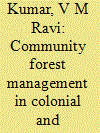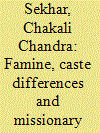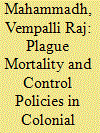|
|
|
Sort Order |
|
|
|
Items / Page
|
|
|
|
|
|
|
| Srl | Item |
| 1 |
ID:
117602


|
|
|
|
|
| Publication |
2012.
|
| Summary/Abstract |
In the past two decades, South Asia has undergone robust reforms in the forestry sector which claim to be initiating a transformation from state-centric to people-centric forest management. This shift is perceived as an important move towards decolonisation in governance processes in India. Examining the forest policies in colonial and postcolonial South India, this article finds, however, that community forest management in postcolonial India remains substantially rooted in the colonial framework of forest resource management policies. In practice, this means that exploitation of forests gives some consideration to the requirements of forest-dependent communities today, but does so now under the control of a state that fails to protect the most basic rights of many of its most vulnerable citizens. The article thus argues critically that supposedly people-centric community forest management in India is not sensitive enough to local development needs, nor indeed sufficiently protective of the basic needs of many forest-dependent people.
|
|
|
|
|
|
|
|
|
|
|
|
|
|
|
|
| 2 |
ID:
190672


|
|
|
|
|
| Summary/Abstract |
This article sheds light on the conditions of Dalits, their experience of caste differences, discrimination and destitution during the Great Famine of 1876–78 in Rayalaseema, one of the Telugu-speaking regions of Madras Presidency. It highlights how existing caste practices defined and shaped famine relief measures, re-entrenching caste hierarchies. The caste location of Dalits aggravated the severity of their living conditions and social life in the village space and in relief works organised by the colonial government, which further reinforced caste inequalities and institutionalised social distancing. Consequently, Dalits experienced hunger, destitution and further marginalisation in society. During such conditions, the humanitarian concerns and charitable activities of missionaries had a profound impact on Dalits.
|
|
|
|
|
|
|
|
|
|
|
|
|
|
|
|
| 3 |
ID:
174908


|
|
|
|
|
| Summary/Abstract |
Focused on colonial South India, this article presents and assesses detailed archival records of public health measures in response to plague outbreaks between 1900 and 1947. Starting in 1897 in the Madras Presidency, the colonial government strictly implemented anti-plague measures and introduced various health schemes and medical policies for plague prevention. However, despite partly vigorous government efforts, plague outbreaks could not be fully controlled. In the twentieth and twenty-first centuries, the plague remains among South Asia’s most feared epidemics, with an outbreak in Surat in 1994 causing major havoc. Neither indigenous knowledge nor Western medical systems provided fully effective remedies regarding causation, cure and prevention of plague epidemics. Since the article gained new relevance in light of current struggles faced by India’s public health system in handling the ongoing COVID-19 pandemic, some lessons from history emerge in the concluding discussion.
|
|
|
|
|
|
|
|
|
|
|
|
|
|
|
|
| 4 |
ID:
159753


|
|
|
|
|
| Summary/Abstract |
Using reports about local resistance of the smallpox vaccination between 1800 and 1805 in colonial India, this brief article analyses how the diversity in both the level and type of resistance, depicted in earlier primary sources, has been distorted by later accounts into a single category of ‘South Asian smallpox vaccination resistance’. Careful analysis of the historical primary documents demonstrates, however, that such resistance stemmed from a variety of reasons, including sanitary concerns, political discontent and practical difficulties in arriving at vaccination centres. The article therefore suggests the need for more careful handling of earlier primary sources in order to not lose evidence of early diversities in reactions to colonial interventions.
|
|
|
|
|
|
|
|
|
|
|
|
|
|
|
|
|
|
|
|
|